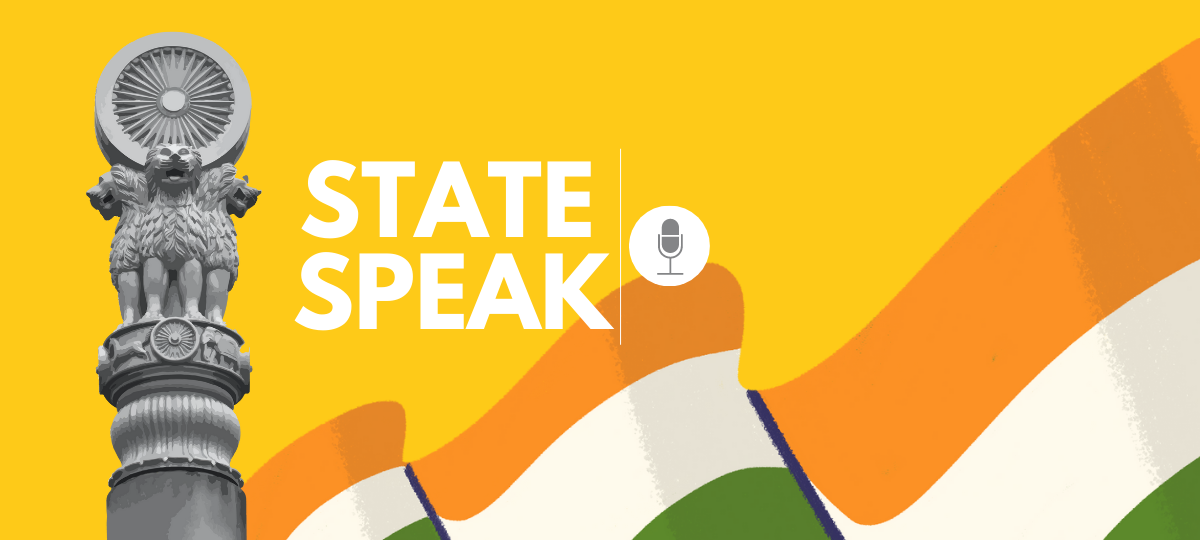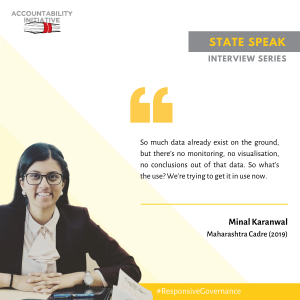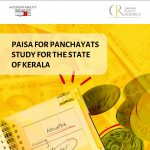
Build Something that Lasts in the System for a Long Time: Interview with IAS Minal Karanwal
25 June 2022
The bureaucracy is considered to be the steel framework that makes the country’s development aspirations a reality, but little is understood in the public about the people behind the scenes. State Speak is an exclusive interview series by the Accountability Initiative featuring insights from IAS officers posted in India’s districts and other public officials who have a vantage point on how the country is being governed, related challenges and best practices.
In this interview, we spoke with Minal Karanwal who is an early-career IAS officer from the 2019 batch of the Maharashtra cadre. She is currently posted as Sub-Divisional Magistrate and Project Officer, Integrated Tribal Development Project (ITDP) in Nandurbar of Maharashtra.
Q. Can you take us through a day in your life as a young IAS officer? What are the kind of activities that you are engaged in, problems you are solving, and plans you are making?
Minal Karanwal: I am currently holding two different positions in two separate departments. I start my day at the Sub-Divisional Magistrate office where I work in the Revenue Department. The office is a little hectic and deals with immediate issues like law and order, land disputes, construction, permissions, etc. A lot of grievance redressal happens there.
After finishing work at the SDM office, I move to my Project Office under the ITDP, which is concerned with implementing developmental schemes for the tribal population in the area.
Q. Nandurbar has been identified as one of India’s most backward districts by the Ministry of Panchayati Raj. It is now being developed as an Aspirational District. What are the governance challenges you face and how are you working on resolving these challenges?
Minal Karanwal: There is a bit of a misconception that people have towards a backward or an Aspirational District. I was actually talking to my field-level workforce a few days back, and this is when I told them they need to realise that, as a headquarter, Nandurbar Block even has private, mobile-based food delivery services! Yes, the living conditions are not at par with a big city, but it is also not a place where you cannot survive.
There are a lot of funds that come into aspirational districts. So, for me, it is a celebration, because I handle a project of a hundred plus crores of rupees. And another project in this district handles Rs. 340 crores, and then the district has a separate fund of Rs. 150 crores. So, one can imagine the amount of money that comes into the district. I don’t want to say that because there’s money or because there’s funding that governance becomes exciting, but of course it becomes easier than it would be in non-aspirational districts.
The only problem of working in an Aspirational District are the assumptions. I’ll give you a small example. Nandurbar is known to have high malnutrition rates. When I used to talk to the local officers who have been working for 20 years and asked them the reason, the first response I got was “ye log khud nahi chahte ki vo kuposhan se bahar nikle” (They do not want to come out of malnutrition) or “the mother has 4-5 children and she’s married early, so she doesn’t know and she doesn’t care”. I remember an SNCU (Special Newborn Care Unit) in a district hospital sharing the challenge that they keep calling mothers to breastfeed, but the mothers don’t come.
So, what has happened is that there are a lot of these assumptions that were carved out because of the inability to succeed. And it is nobody’s fault. It is how we get stuck in a problem sometimes and we give ourselves the benefit of the doubt. When there is a lot of malnutrition, or there is a lot of illiteracy, we pin it down to “they don’t want to learn”, because we’ve failed at resolving that problem. That is the biggest governance challenge I have, and am trying to move past.
Q. Do you believe that there is a need for retraining there, and how frontline workers and officials work with the communities?
Minal Karanwal: Definitely. So, there are two projects I’ve been working on, and I remember one of the teachers here messaged me and said that for the first time someone had looked at them not as powerless and useless, but as a resource. He felt like, for the first time, we were not dependent on any development partner, because I have severe reservations with that. Or, you know, let’s say, just me telling them what to do.
I think frontline workers are very powerful. They have been on the field in their own department, so they become specialists over a period of time with what they have been doing, no matter how small it is. So let’s say an AWW (Anganwadi Worker) might just be giving khichdi to a mother, but she knows exactly what the problems are in making that khichdi and then actually feeding it. For us, she becomes a huge resource person.
Looking down upon them and belittling their contribution, I don’t believe in that. I have seen so much expertise existing on ground, especially with health. When I see my medical officers or community health officers, they know; it is just that they are not free from the system to act on their own. So that’s a huge problem.
Q. You recently published a research paper, and in this respect, you have donned the hat of a researcher. What role do you think quality data plays in decision-making and policy implementation?
Minal Karanwal: A lot! It is insane how data are completely underutilised in this nation. And there’s data everywhere. I’ve read Herbert Simon, because I’ve been a public administration student, and he has said that the biggest problem with data is data overload, not that it’s scarce or of bad quality. If you meet an Anganwadi worker, you’ll see that she’s filling a register all the time, but what is she doing with it? What is anybody sitting at the district headquarters doing with it? Nobody knows!
I’ll give you a small example. In Nandurbar we’re now launching an app to track breastfeeding. We’ve realised that there is a weight gain velocity because of breastfeeding. We are trying to bring this to the field. So, initially also, there was a huge amount of data on HBNC (Home Based Newborn Care) to track a baby’s weight gain. There was so much data being recorded in registers, yet nobody was monitoring it, nobody was being held accountable. So, data are not just a standalone fact or a point, they need to be connected to some kind of discovery or some kind of policy solution, or not even policy, just a solution for the benefit of the child.
Also, this is a very funny thing that 2.5 kgs is the mean weight of a child anywhere in this country, because anything below 2.5 kgs – even 2.49 kgs – means that the child is SAM (Severe Acute Malnourished) or MAM (Moderate Acute Malnourished), and the AWW would have to do more work. So what she does is, instead of putting [recording] 2.49 kgs, she’ll put 2.5 kgs. Now, with this algorithm, we can also read the fact that somebody is entering similar kinds of weight gains over a period of time.
Q. Can you suggest some data practices for other young administrators to actually make use of data which is available in the field?
Minal Karanwal: I think all young administrators who enter the service should first know what data politics is, because there’s a huge amount of data politics on the field. Of course there is manipulation but you need to understand why, for example, is the teacher manipulating her FLN (Foundational Literacy and Numeracy) data. Because it’s related to punishment or incentive.
Understand where your data are lacking. You have data, good enough, but what do you not have on your plate? And what do you get out of your data? So, if you feel like out of a sample of 100 people, you are getting a good enough conclusion for a larger area, good for you. But in my opinion, do sit with it, analyse, reanalyse, question, and then come to a conclusion because it’s easier. I don’t feel it’s a domain of sophisticated statisticians or data analysts. It’s very basic, if you understand the problem, you understand the reporting, and then you understand the solution — you will have your answer by yourself.
Q. India is celebrating the 75th year of independence. As per you, what will be the role of the IAS cadre going forward?
Minal Karanwal: In my opinion the service community, as a whole, should try to be more aware of the field. So I always say this jokingly that we are talking about artificial intelligence (AI) and robotics and the new India, which we should, and there are parts of India that are ready for AI and smart cities. But there are a lot of basic questions that India still needs to deal with.
There are questions of hunger, basic health, anaemia, child marriage, early childbirth, birth spacing, that we’re still dealing with. To say that “ye log apni madad khud karenge” (they’ll help themselves) or that they just don’t listen to us, is akin to shedding responsibility.
Q. What is the kind of support that you think early career civil servants will need to be able to grow?
Minal Karanwal:. I’m not a very big supporter of the development partners in the field that come and spoon feed officers, and the same goes for research institutions. I want officers to be confident and open-minded of who they are and where they’ve reached. Clearing this exam itself is a big challenge; you’ve cleared it, you’re here now, you’re in a decision-making position.
When you sit on such an important pedestal, you are free to evaluate anybody who comes to you, but that evaluation should happen from a perspective of public service. Now, public service, again, is not only rhetorical, like I want to help people. Helping people will become the consequential outcome of something that you will do, but realise that you sit in a system as huge as an elephant. And that system is very powerful!
I always say that, no matter what an NGO or what a research institute can do in a particular area, your decision will have a fast and loud impact on your jurisdiction. When you sign a file, and you’re sitting on a system that is actually promoting your decisions, and you have an entire hierarchy promoting your decisions, imagine the amount of power with you. So that should lead to a lot of sensitivity, responsibility, and also a very humble realisation that you are capable enough of bringing a change through the system. So don’t work outside of it. Do not make temporary solutions with partners on the field, build something that lasts in the system for a very long time.
Q. According to you, what are the governance challenges that India will be looking at in the next 10 years?
Minal Karanwal: [Awareness is a good thing and a bad thing.] When people get aware, it helps us. Let’s say when COVID-19 came, and people were aware that they had to be away from each other or wear masks, it helped the administration. But also given that there is a lot of awareness of the wrong things, with wrong information out there, with wrong data, a lot of people are not really going in-depth on what they’re listening to. That creates a lot of challenges for us, because you need to realise how precarious our position becomes.
If we tend to ‘fight’ with a citizen, for example, they say that we’re very high handed. If we don’t, we see the citizen right in front of us promoting something that we know will harm other citizens. So that kind of wrong awareness and the wrong confidence that comes with it has been a huge challenge, at least for me, on the field.
The second challenge would be resource management. When people look at the environment or people look at any other resource, they tend to be very selfish with it, including myself. And these resources are depleting every day. Managing them at a point of time when we’ll be short of them would be a huge challenge.

This interview has been edited for length and clarity.
Editorial inputs by Avantika Shrivastava.
The opinions expressed are personal and do not represent an institutional stand.
Also read: We Need to Listen to the Communities We Work With: Interview with IAS Dr. Mittali Sethi





